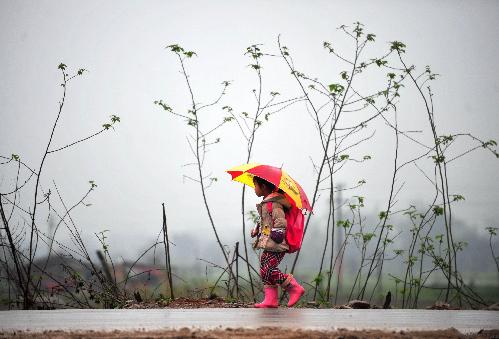|
 |
|
HIDDEN DANGER: A primary school girl walks home alone after class in Liuzhou, Guangxi Zhuang Autonomous Region, on March 11, 2014 (HUANG XIAOBANG) |
Child victims of sexual abuse may not be preyed upon by strangers, but rather people known to their family, according to one report published by the Protecting Girls program, a charity project, in May 2014. The report covered sexual abuse cases exposed by the Chinese media from May 23, 2013, to May 22, 2014.
In recent years, there has been increasing media coverage on children becoming victims of sexual abuse. On May 8, 2013, a headmaster and a government employee in south China's Hainan Province were reported to have taken six primary school girls to hotels. Within 20 days of the incident going public, eight more cases of children being sexually abused had been reported by the Chinese media. These incidents have caused nationwide concern over the safety of the most vulnerable members of society.
Reports of sexual assaults on minors were disturbingly frequent from 2013 to 2014 in China, with a total of 192 cases having been reported by the media, according to the aforementioned report, averaging out at one reported case every 1.9 days. However, the total is tragically predicted to be far higher, with unreported incidents considered to likely be much more common, as victims are often afraid to tell their parents or teachers.
In some cases, parents who have learned about the cases have chosen to keep quiet out of concerns over their children's reputation, Wang Zhongwu, a professor of sociology at Shandong University, told Xinhua News Agency in July 2014.
The report also said that most of the 343 victims involved in the reported cases are primary school students, with children between 8 to 14 years old accounting for 85 percent of the total. Over 55 percent of the cases happened in rural areas, where many children have been left behind in the village to live with other relatives while their parents seek a living in the cities. Of the 192 cases, over 80 percent were committed by acquaintances, with 42 cases committed by the victims' teachers and 36 by their neighbors.
For example, seven girls from Shangyuan Village Primary School in Ruichang, east China's Jiangxi Province, were sexually assaulted by their 62-year-old teacher Tao Biaogong from September 2012 to May 2013, according to Xinhua. Tao called the girls to the classroom or to his dormitory under the premise of correcting their homework or listening to them recite passages from the textbook. Six of the seven girls were found to have contracted sexually transmitted diseases, and all of them were left-behind children whose parents entrusted them to the care of their grandparents when they were less than 1 year old. In addition to the physical harm caused, the girls have mental scars that could be considered even worse, with some tragically showing suicidal tendencies at their young, fragile age.
"Left-behind children, especially girls, who live with their grandparents or other guardians often lack adequate protection and care, which predators may identify as an opportunity. The psychological wounds inflicted on this group of children are often deep and difficult to heal," said Sun Yunxiao, Deputy Director of the China Youth and Children Research Center.
It should also be noted that being a victim is not gender specific. Of the 192 cases reported, six cases were assaults on boys. For example, a 7-year-old boy in Shadun Village of Wuxue, central China's Hubei Province, was sexually abused by one of his male teachers and contracted a sexually-transmitted disease from the attack, Xinhua reported back in 2013.
The boy's parents worked far away from home in south China's Guangdong Province. The boy told his parents that the teacher would give him some snacks to eat every time before he abused him. As a result of the abuse, the once active and happy boy has become quiet, according to his mother.
"Today more and more boys are becoming victims of sexual assault. However, as the victims are often ashamed to report the incidents or lack awareness of self-protection, many of these cases have been kept secret," Gao Yujing, the host of a helpline for children of single parents, told Beijing Evening News in November, 2014.
"Sexual abuse will cause both physical and psychological damage to a child. Some victims will hate school, suffer anxiety or depression, or even develop split personalities. It may also affect a child's attitude toward sex," Li Chunman, a psychologist told China Youth Daily in July 2014.
|
